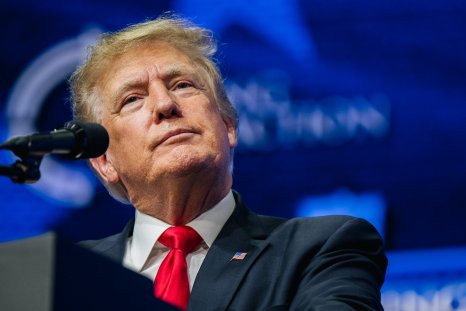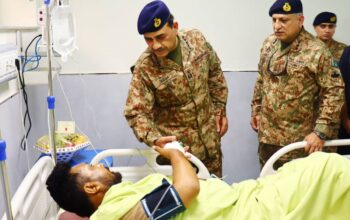By Staff Reporter
ISLAMABAD: President Donald Trump on Tuesday urged India and Pakistan to ‘go out to dinner’ to settle their disputes, as the State Department stressed the need for direct talks between the two nuclear-armed neighbours.
Speaking at the Saudi-US investment forum in Riyadh, Trump touted his role in securing a weekend ceasefire between the South Asian rivals and pressed them to capitalise on the breakthrough.
“I said, ‘fellas, come on, let’s make a deal. Let’s do some trading. Let’s not trade nuclear missiles, let’s trade the things that you make so beautifully,’” Trump said, offering no specifics on which leaders he addressed or when.
“They’re actually getting along,” he added, turning to Secretary of State Marco Rubio, who joined him in Saudi Arabia. “Maybe we can even get them together, Marco, where they go out and have a nice dinner together.”
In Washington, State Department Principal Deputy Spokesperson Tommy Piggott told reporters the U.S. was focused on fostering direct engagement between the two nations.
“We welcome the ceasefire reached between India and Pakistan this weekend and we commend both prime ministers for choosing the path of peace,” said Piggott. “We also want to encourage direct communication between the parties.”
The US helped broker a ceasefire between the nuclear-armed rivals following intense missile and drone attacks, which started after a gun attack in Pahalgam in occupied Kashmir, that killed 26 people.
Delhi blamed Islamabad for backing attackers. Islamabad denied involvement and offered an independent probe, with tensions reaching a boiling point after India fired missiles at what it said were “terrorist infrastructure” in Pakistan last week. Pakistan said Indian attacks killed only civilians, including children, vowing retribution.
The conflict had rapidly intensified, and Pakistan said it had shot down five Indian aircraft. Tensions spiked further on last Friday when Pakistan’s military had reported shooting down 77 Indian drones over multiple locations, including Karachi, Lahore, and Rawalpindi. Early Saturday, reports emerged of Indian missile strikes on several airbases in Pakistan
Pakistan launched a major counter-attack against India on the same day, targeting the rival’s key military installations. By Saturday afternoon, back-channel talks led by the Trump administration secured a ceasefire.
A day later, President Trump offered to mediate the decades-old Kashmir dispute between India and Pakistan, coupling his proposal with a promise to “substantially” increase trade with both the nations.
The ceasefire marks a pause in decades of hostility between the two countries, which have fought three wars since their 1947 independence, two over Kashmir. The Kashmir dispute remains a persistent flashpoint, and while the truce is a step toward de-escalation, core tensions linger.
Asked whether Pakistan had pledged to curb alleged terrorist activities—a charge India makes and Islamabad denies—Piggott sidestepped specifics, reaffirming U.S. support for dialogue. Pakistan rejects the accusations as baseless, often citing them as a pretext for Indian aggression.
“We have been clear on that,” Piggott said. “We continue to encourage that direct communication. The president has been clear on that and … has also been in praising both prime ministers for choosing the path for peace and wisdom.”
India, however, has long resisted U.S. mediation, insisting on bilateral talks. Piggott declined to critique New Delhi’s stance. “I am not going to speculate on that,” he said. “What I can say is that we encourage direct communication.”
Pressed on whether Indian Prime Minister Narendra Modi’s position frustrated Washington, Piggott stayed diplomatic. “What we are happy to see is a ceasefire. That’s what we are happy to see,” he said. “That’s where our focus remains. We want to see the ceasefire maintained and we want to encourage direct communication.”
“Our focus is the ceasefire. Our focus is on encouraging direct communication. That’s where our focus is going to remain. The president has spoken on this.”
Copyright © 2021 Independent Pakistan | All rights reserved




